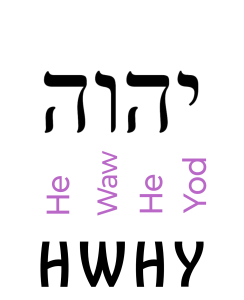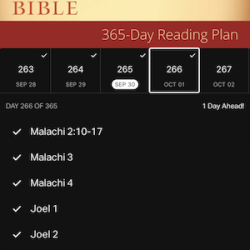What is God’s name? The Tetragrammaton explained
God is known by many names. You may have heard titles such as, Elohim (Hebrew: god), Adonai (Hebrew: lord), Jehovah, HaShem (Hebrew: the name) to refer to God. But what IS God’s name? Does He have one? And how do we know how to pronounce it, if He does?
The Burning Bush
In the opening of Exodus 3, While tending sheep near Mt. Sinai, Moses encounters the Burning Bush, a flaming bush by which God communicates with Moses about approaching Pharaoh in order to free the Israelites from Egyptian bondage.
In verse 13, Moses tells God that when he returns to the Israelites and tells them that the God of their fathers has sent him to lead them that they may ask the name of God.
“What shall I say to them?” Moses asks God.
In verse 14, God replies, “I AM WHO I AM.” He continues to explain to Moses that he is to simply tell the Israelites, “I AM has sent me to you.”
Eyeh Asher Eyeh
In Hebrew, “I AM WHO I AM” is Eyeh Asher Eyeh. Eyeh derives from the word “hayah,” meaning “to be,” therefore, Eyeh Asher Eyeh can be interpreted as “that which is,” “that which will be,” “that which will always be.” In other words, Eyeh Asher Eyeh, or I AM WHO I AM, describes the very character and unchanging nature of God. He has always existed and always will, and with Him is all existence. Simply put, He IS.
The Tetragrammaton
The Tetragrammaton, made of the Hebrew letters, read right to left, Yod, He, Waw, and He – הוה’ – is the word used in the original Hebrew manuscripts of the Old Testament to refer to God and derives from the root, “to be,” and is most commonly transliterated YHWH and pronounced as

Yahweh.
Though Yahweh is the most common pronunciation of God’s name, some Messianic believers use different interpretations of the Tetragrammaton, such as Yahovah.
Their understanding comes from the Masoretic texts, which were texts that added vowel points – various dots and dashes – to Hebrew. These vowel points were added between the 6th and 10th centuries and are not original to Hebrew Scriptural manuscripts. Being they were added by man to create pronunciations, we cannot and should not rely on them as “gospel.”
Is it wrong to say Yahovah rather than Yahweh? Of course not. But, no matter how one chooses to pronounce הוה’, truth is, we don’t know EXACTLY how it is pronounced. This is why the Israelites/Jews say it is the ineffable name and use words like Elohim or Adonai for God/Lord, rather than mispronounce הוה’ (YHWH). Quite often, Jews will say “HaShem,” meaning The Name, as in Baruch HaShem, which is loosely understood as “God Bless.”
In Conclusion
Yes, God has a name. It is הוה’. It is I AM. His name defines Him, His being, His character. And however one chooses to call upon Him is a personal preference. God knows our hearts. He knows we are calling to Him.
But anyone who claims their pronunciation is the only correct way is in error. Moses is the only person who ever heard it straight from God Himself. And though Moses spells it for us, he never gave us the phonetics to go along with it. And, unlike the ones who wrote the Masoretic texts, who decided to create a pronunciation, we do not know what vowels belong between what consonants, or even how many syllables are in the name.
All we know for certain is the Lord’s name is הוה’ (YHWH).
God Bless and Shalom!


















